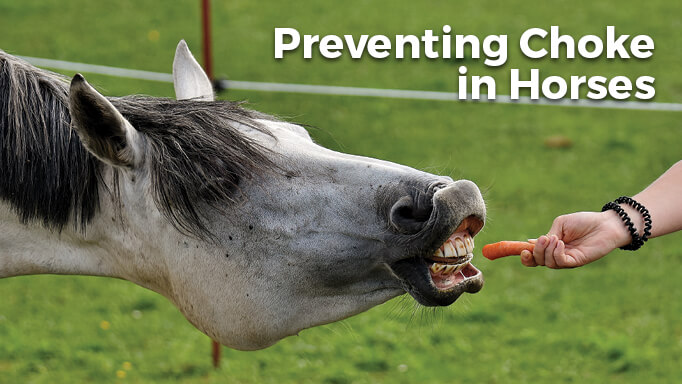We’ve all known horses that are better described as vacuums – they seem to inhale their food rather than chewing and savouring every bite. Usually, the only bad outcome from dealing with these types of horses is occasionally a stepped-on toe from the pushy exuberance for incoming feed or hay; however, sometimes the result can be choke.
Choke in horses is different than in humans. Horses experience an esophageal obstruction rather than an obstruction in the trachea. The obstruction is usually a bolus of dry hay or feed that gets stuck in the musculature of the tube bringing feed material from the horse’s mouth to its stomach. This results in the horse being unable to fully pass any saliva or feed stuffs into its stomach. It can be quite painful and often horses become agitated and anxious when it occurs. Clinical signs include excess salivation, green or brown nasal discharge that includes particles of feed, and coughing.
Because there is often a build-up of feed and saliva in the horse’s pharynx or throat, aspiration pneumonia is a fairly common complication after dealing with a choke. This is because as the horse is coughing and breathing in quickly, the feed particles and saliva present in the pharynx are likely to get inhaled into the lungs, bringing with it bacteria that can lead to a severe lung infection.
Another complication that comes with choke is an esophageal stricture, where inflammation of the esophageal muscle and mucosa (from having a food bolus stuck) results in scar tissue. This scar tissue is less flexible than muscle and results in a smaller opening for food to pass through. This, in turn, also creates the perfect environment for more obstructions in the future.
The good news is that most chokes can be resolved pretty easily with veterinary attention. Treatment includes passing a nasogastric tube and slowly pumping water into the esophagus to break up the food bolus. Occasionally this treatment is not successful and the horse may need to be referred to a hospital for further workup. Your veterinarian will also start your horse on antibiotics in hopes of preventing any pneumonia or respiratory infection.
So how can you prevent choke? The main way to prevent it from occurring is through regular routine dental care from your veterinarian. Your veterinarian will sedate your horse and place him or her in a speculum to enable a thorough examination and float of their teeth. This is essential to identify any teeth in poor condition, recognize any soft tissue problems, and fix any malocclusions to better enable proper grinding of food. When horses are able to grind their food properly, the food particles get broken down to an appropriate size, which decreases risk of choking – and also impaction colic!
If your horse is a Hoover, certain specialized feeding tubs can slow eating down. Slow-feed hay nets are also a great way to encourage hay to be chewed properly and consumed in smaller mouthfuls.
Soaking beet pulp or pelleted feed is recommended to enable easier passage of feed down the esophagus. Most senior feeds are designed for horses that have poor dentition and are formulated to break down easily, making them less likely to create an obstruction.
If you have concerns that your greedy or older horse may be at risk for choke, discuss with your veterinarian ways to keep him healthy and happy.

